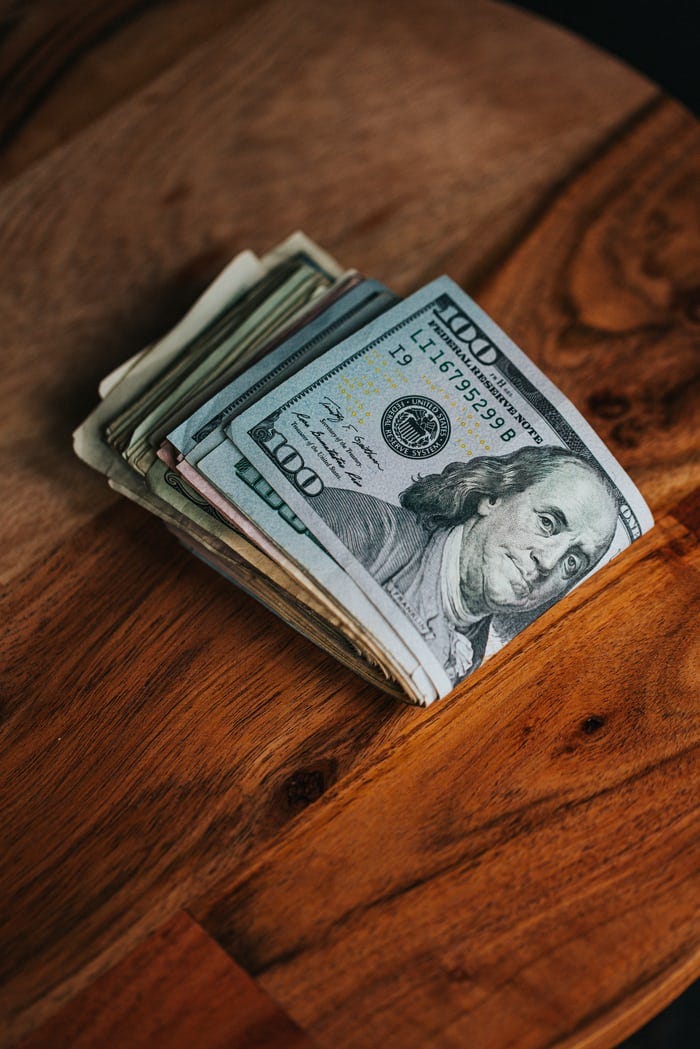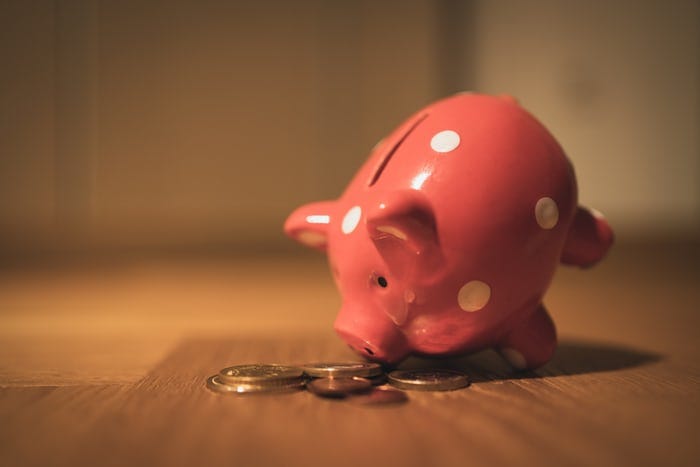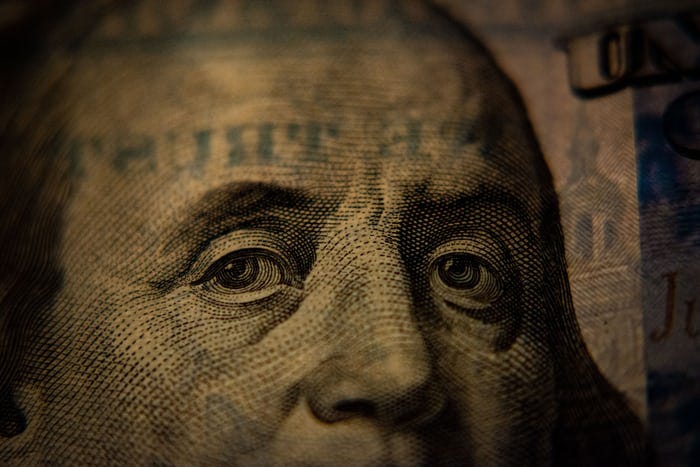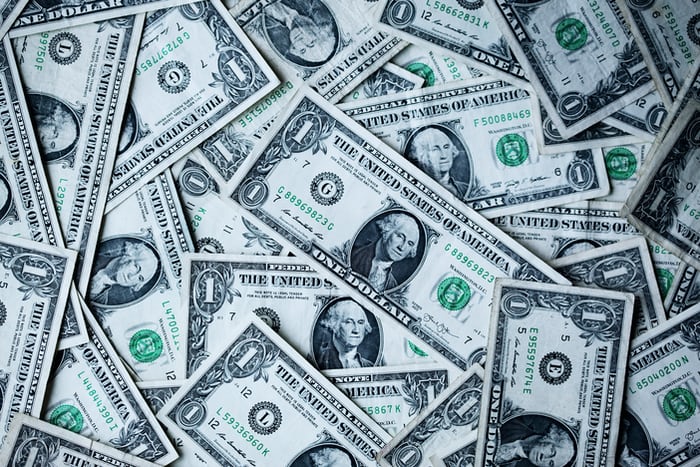I can feel it already…
Put your thumbs down.
This is going to take a lot of convincing for a majority of readers, specifically Millennials and men.
What if I told you the recommended, safest, and no-fail proof emergency fund amount is equivalent to saving 6–12 months of expenses?
(Absolute shock around the room)
You would never think in a million years, no pun intended, that millionaires and above would own the most cash and have consistently kept this amount in check to help them get to where they are today!
What a silly choice right?
Especially in this environment, cash degrades in value due to inflation currently sitting at roughly 4%. At least debt erodes. One is earning less interest in their savings account than what the bank earns off their deposits and reinvests it instead earning double the rate.
Cash is purely liquid only used for so-called ‘toxic’ purchases, as most say. If you have cash, it’s bound to be spent on materialistic items or those of low-value add than a real deal.
They say, no good can come out of cash. Even money-market funds, short-term debt instruments such as CDs, commercial paper or treasury bills offer little to no interest that don’t propel anyone’s portfolio all that much.
The problem is, if you’re trying to get an IMMEDIATE reward from everything, you are digging a deep hole for yourself.
Yes the ultimate goal is for your money to work for you not against you but it shouldn’t be the case all the time! It also needs to act as your parachute, life boat, cushion, and umbrella when you need it the most.
Selling your gains at the top of the market and paying income tax on top is sillier than keeping no cash!

Cash Controversy
The younger you are, the less risk averse you should ultimately be because you have a longer time horizon to ride out the losses and recoup them with eventual gains in the future. The major indexes go up overtime so might as well invest passively. It historically beats out active investing anyway. Save yourself headache, money, time, and hassle.
More time in the market beats timing the market and provides an opportunity for stellar returns which stems from keeping cash on the side. A 20 year old should have a split in their portfolio of around 80% equity versus 20% in fixed income. A 70 year old planning to retire tomorrow should be around 50% equities, 50% bonds, commodities, money-market funds, etc.. To find out your allocation split, subtract your age from 110 and that can be your recommended equity balance and the rest goes to wherever you please.
Retirees cannot afford to stomach all the volatility that comes about from equities and their favorite Blue Tech stocks that go hay-wire every time interest rates bump up. Grandma and grandpa need stable interest and dividends from defensible, consumer stable companies and a large stake in bonds, bills, notes, and U.S. government debt, the most stable investment of all. Although this is more liquid than real estate, it certainly isn’t considered cash yet. It is a big mistake to blend the two.
Dependent on your savings rates, if you save less, it is harder to keep cash since you don’t have enough disposable income to save in the first place. On the flip side, if you save more, you have more disposable and discretionary income to spend and allocate towards your cash cushion which should always be near 6–12 months which we will get into exactly why in a bit.
The younger you are, the less cash you can have since it’s easier to crash at a friend’s house or eat Ramen if an income stream goes sideways. But if you are picky and cannot do that, then you need, well, more cash!
It’s all based on risk tolerance and the budget but the universal rule is to always have cash no matter your net-worth. That is non-negoaititeble. I and the billionaires of the world would go as far to say that you need more cash than invested assets.
Why and how in the world?
What’s certain is uncertainty and if you have all your money invested, the amount of short-term capital gains a.k.a atrociously large income tax you must pay to sell your investments not only looses you an income source right there but the taxes would most likely surmount to more than the amount of cash you are taking out!
Women are known to be traditionally conservative, risk averse investors yet at the same time, not that it’s a competition or anything, ironically their portfolio returns are around 40 basis points higher, they carry on less debt, are more responsible spenders, and would be wealthier if the stubborn pay gap and discriminatory tax called the pink tax weren’t all that high!
Since women live longer and don’t gamble as much as men do through retail trading apps Robinhood or WeBull, they know how to plan for the long term which means holding onto more cash at an amount that men laugh at until they need it themselves late night at the casino.

Why 6–12 Months of Emergency Expenses Is Ideal
In March 2020 when the global pandemic sprang out of control, the world was in a state of shock. We were in panic mode, the markets fell, not for too long but was the sixth worst drop in history done by 9.9% due to pure uncertainty. Small businesses had to shut down, supply chains cut their inventory unsure about future market expectations, bad idea since we’re now in a supply chain shortage going into the holidays, people went work from home bound, companies laid off workers leading to high unemployment, and employees didn’t feel safe working in highly prone areas of infection.
The economy and the stock market were actually correlated in March 2020 for a hot sec until they dispersed again just like on the income, wealth, and educational divide and on frankly every other possible issue pertaining to public safety and politics.
Fast forward to today, thanks to the stimulus program, Child Cares Act, the Great Resignation of side-hustling, entrepreneurialism, self-care, pharmaceutical companies working day in and night to develop a cure, and quantitive easing of bond buying from the Fed, this lead to inflation, consumer spending to rebound, optimism, growth of GDP and CPI (consumer price index a.k.a spending), labor shortage, and most importantly the vaccine rollout, through the power of science all lead us to normal life again.
At the start of the pandemic, we learned that even the most stable jobs in the tourism, leisure, travel, and hospitality space could vanish. Not only people lost their jobs, if they were invested, they lost their income, then if they happened to own a rental and their renters would in the same boat, unable to pay their rent, they lost them and also their health was at risk, the biggest risk of them all.
You cannot possibly sleep at night having all those troubles and don’t even mention the government or a best friend to step up. They are dealing with their own troubles and cannot support you. Depend on no one except yourself at all times to survive.
It’s frightening how in the wealthiest nation in the world, wealth is so poorly divided that the rich profit off of the poor in times of crisis and everyone must fend for themselves.
In order to best prepare yourself, plan for the worst hope for the best.

1% Cash Cave
So why are we so scared of cash?
Would you rather be scared your investment funds aren’t beating the market or that you cannot supply food on the table?
That’s the question you must ask yourself with less or no cash.
If it’s one thing for sure, we better follow the uber rich on their investment ideas than anyone else. Clearly they’ve done something right all this time. Maybe not everything, but at least in terms of growing their wealth.
If we can’t beat them, let’s join them and hear what the top 1% of the world has to say with their fascination and love for hoarding cash.
In one 2020 CNBC survey, it found the average investor held roughly 23% of their portfolio in cash and cash equivalents. This sounds outrageous to the average middle wage earner who ends up spending a good 50%+ of their income, saving most likely less than 20% and investing the rest no left for cash.
The more you earn, the easier it is to save and by in large, have too much money you don’t know what to do with.
But what is fascinating is that the top 1% have essentially run out of investment ideas, so they’ve decided to park a whooping $4.7 trillion in the bank. With a T! At the end of the day, how many blue-chip stocks and homes in the Hamptons can you buy? Cash is easy, sturdy, and simple.
With the 10% owning 53% of financial assets, the top 30% owning 80% and the bottom 50% only with less than a staggering 1% of wealth in this country, it is fair to say wealth hasn’t trickled down for those in need.
While the working class and impoverished families have been working hard to preserve every penny they earn, the wealthiest don’t know what to do with it yet still decide not to pay their fair share in taxes or donate it with a real cause. Anyway, we cannot tell them what or what not to do but we can learn a thing or two from them since it’s all transparent.
Most people would say it doesn’t make any sense to have such a large savings balance when one is earning millions per year but the wealthy have a real good reason(s) as to why almost 40% of their portfolio is in cash and stocks average only 25%. The rest of their portfolio is tied up in illiquid assets such as private equity, VC, hedge funds, fixed-income, commodities, real estate and alternatives including fine art, farmland and collectibles to name a few.
40% is an unrealistic number for the most of us. Not even an attainable savings rate if earning minimum wage or living in a coastal city. But it could be the underlying reason as to why you may feel your wealth is plateauing.

Reasons for A High Cash Stash
The wealthy know how to sniff out a great deal and it usually occurs when you least expect it. In order to understand markets and how they work, you must look back in history and realize that things aren’t always jolly 24/7. You must prepare yourself for the worst and hope for the best and the rich are most prepared to do this.
As witnessed during the ongoing covid crisis, the top 10% amassed a staggering $7 trillion in wealth while the bottom 90% only earned roughly $1.5 trillion according to CNBC.
The reason being is because they preserve their capital, cash, liquid assets at all times, rarely rebalancing. They have a safety cushion and when a recession hits, they do better than most and rise up the ladder scouring for deals and other opportunities instead of worrying about getting evicted and selling their investments to pay for tuition.
They understand history and the unexpectedness of life. Specifically if you are a business owner which in the case of the richest in the world all of them have to be, they have stomached volatility and know it is bound to happen. What’s certain is uncertainty and it doesn’t bother them because their portfolios are built for it.
In addition to this, here are some of the additional obvious reasons the wealthiest hoard the most cash:
-They are constant opportunity seekers, always looking for new fortunes and need cash to do so
-They know what it feels like to have nothing
-They are patient for the right time and right place
-They prepare the most
-They want to be stable and secure at all times
-The wealthier you are, the more you are taken advantage of and want to make sure your assets are spread out evenly not heavily invested with large positions in one area of the market
-Don’t feel the need to spend all that much after a certain point-more hassle than an enjoyment-especially when it comes to vacation homes
-What most don’t realize is that when 1 income source flops, a few others tend to go along the same way. Ex: when the economy flops, your earned income could drop and your renters and the market. 3 income sources down right away
-They know to never sell their large positions in the market and pay extraordinary tax on top
-Educate/invest in themselves more and know that there are other ways to keep cash through money market funds, treasuries and CDs than just in a savings account
-Although they have more diverse allocations, they want to make sure they are negatively correlated and cash helps stabilize this
-More you earn, the more you tend to spend and less you keep. Cash will keep you sound if an income or two flops. Emergencies and hiccups are inevitable it’s not a matter of WILL they but WHEN and they are masters at understanding this
-Most have taken the slow boring simple route towards building wealth through long term passive investing not day trade gambling. They know cash is king in this regard.
Although we may not be a part of the top 1%, it doesn’t mean we cannot become a part of it eventually, if that’s really your goal. Contrary to popular belief, 80%+ of millionaires and above are self-made. They didn’t get dumped with an estate inheritance or lump-sum. It took time and the boring route.
You don’t need to build the next rocket to land it big. You need to aggressively save and invest until it starts to hurt. But still enjoy life and keep that cash on the side to know you can have fun.
Rarely do opportunities fall onto our hands. We need cash to watch over them and check out what’s hot in the market before anyone else can liquid their investments.
Good things come to those who wait and do the work!
And for those cash haters out there, good luck sleeping at night or every time there’s a correction which is almost every month now in these frothy markets! CDs to money-market funds, treasury bills and commercial paper doesn’t count as cash! Cash is cash and it will always be king!
No one wants their cash to devalue due to inflation and keeping it in the bank helps no one. If we had a choice to keep all our wealth in the markets and pull it out anytime without paying taxes on top , everyone would do so but the wealthier one gets, the more they know not to keep everything invested.
Stay prudent and risk whatever you’re willing to loose except for cash.

